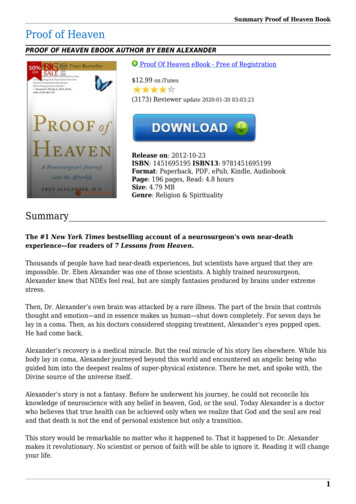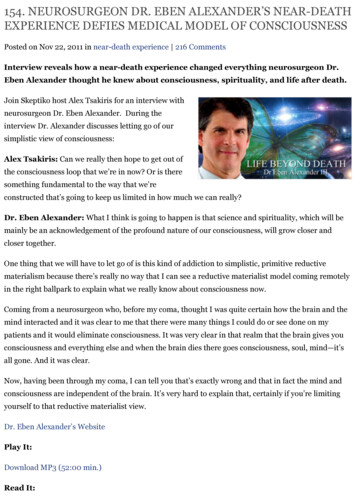
Transcription
154. NEUROSURGEON DR. EBEN ALEXANDER’S NEAR-DEATHEXPERIENCE DEFIES MEDICAL MODEL OF CONSCIOUSNESSPosted on Nov 22, 2011 in near-death experience 216 CommentsInterview reveals how a near-death experience changed everything neurosurgeon Dr.Eben Alexander thought he knew about consciousness, spirituality, and life after death.Join Skeptiko host Alex Tsakiris for an interview withneurosurgeon Dr. Eben Alexander. During theinterview Dr. Alexander discusses letting go of oursimplistic view of consciousness:Alex Tsakiris: Can we really then hope to get out ofthe consciousness loop that we’re in now? Or is theresomething fundamental to the way that we’reconstructed that’s going to keep us limited in how much we can really?Dr. Eben Alexander: What I think is going to happen is that science and spirituality, which will bemainly be an acknowledgement of the profound nature of our consciousness, will grow closer andcloser together.One thing that we will have to let go of is this kind of addiction to simplistic, primitive reductivematerialism because there’s really no way that I can see a reductive materialist model coming remotelyin the right ballpark to explain what we really know about consciousness now.Coming from a neurosurgeon who, before my coma, thought I was quite certain how the brain and themind interacted and it was clear to me that there were many things I could do or see done on mypatients and it would eliminate consciousness. It was very clear in that realm that the brain gives youconsciousness and everything else and when the brain dies there goes consciousness, soul, mind—it’sall gone. And it was clear.Now, having been through my coma, I can tell you that’s exactly wrong and that in fact the mind andconsciousness are independent of the brain. It’s very hard to explain that, certainly if you’re limitingyourself to that reductive materialist view.Dr. Eben Alexander’s WebsitePlay It:Download MP3 (52:00 min.)Read It:
Today we welcome Dr. Eben Alexander to Skeptiko. Dr. Alexander has been an academic neurosurgeonfor more than 25 years, including 15 years at Harvard Medical School in Boston. In November of 2008,he had a near-death experience that changed his life and caused him to rethink everything he thoughthe knew about the human brain and consciousness.Dr. Alexander, welcome to Skeptiko.Dr. Eben Alexander: Thank you. It’s good to be here.Alex Tsakiris: Well, your story is really quite amazing. For those who haven’t heard of it and aren’taware of what you went through, do you want to tell us a little bit about your experience?Dr. Eben Alexander: Yes. It really struck out of the blue. I’d been quite healthy up until that time. Infact, I was in reasonably good shape because my older son had been putting me through a big workout,anticipating a climb of a 20,000 foot volcano in South America.Alex Tsakiris: Wow.Dr. Eben Alexander: Luckily I was in pretty good shape. At 4:30 in the morning, November 10,2008, I got out of bed. I was getting ready to go up to work. I was working in Charlottesville at the timeand I had severe sudden back pain, much worse than I had ever experienced. Literally within 10 or 15minutes, it got me to a point where I could not even take a step. I was really in tremendous agony.My wife, Holly, was rubbing my back. Then my younger son, Bond, came in and saw I was in a lot ofdistress and he started rubbing my temples. I realized when he did that that I had a severe headache. Itwas like he took a railroad spike and put it through my head. But I was already really going down veryquickly. I didn’t know it at the time.I found out much later that I had acute bacterial meningitis and it was a very unusual bacteria. Onethat the incidence of spontaneous E. coli meningitis in adults in the U.S. is about 1 in 10 million peryear. So it’s really rare. We never found out where it came from. But at any rate, it was in about 2 to 21/2 hours it drove me deep down and in fact, my last words really were to my wife, “Don’t call 911.Trust me, I’m a doctor.”Luckily she overruled that and she did that because she saw me having a grand mal seizure on the bed.Of course I don’t remember that and I really don’t remember anything that happened for the next weekbecause I was gone. I was very sick during that time as I heard later. In fact, I was so sick that I was ona ventilator the whole week.They did several lumbar punctures trying to guide therapy. I was on triple antibiotics very early on, dueto a very good medical team. They did a lumbar puncture about the second or third day into this andmy cerebral spinal fluid glucose, which is normally around 60 to 80 and in a bad case of meningitismight drop down to about 20, well my glucose went down to 1. So I was really sick.
Alex Tsakiris: So at this point, nothing should be going on in your brain and yet something washappening in your conscious awareness.Dr. Eben Alexander: Yeah, I’d say that’s correct. To me, and I’ve spent a lot of time in the last threeyears trying to explain this and that explanation initially, all I was doing was trying to explain itneuroscientifically. Meningitis is very helpful because it’s probably better than anything else at reallydiffusely wiping out the neocortex. But one can always argue that there’s some idling function at a deeplevel that might still survive.In fact, one of the hypotheses that I entertained about all this was because the experience that I’lldescribe to you seemed very hyper-real and extremely crisp and vivid, much more real and interactivethan sitting here and talking with you right now. I mean, it was extraordinary. That is something that isoften described in near-death experiences and of course one of my early hypotheses was well, maybethere’s some differential effect against inhibitory neuronal networks that allowed over-expression ofexcitatory neural networks and gave this illusion of kind of a hyper-real situation.I can tell you from having lived through it that it was so powerful and so beyond that kind ofexplanation that I wasn’t very hopeful that that would work out in the end. But I figured I needed togive it a chance and look at the microanatomy in the cortex and the different connections with thethalamus and basal ganglia and see if I could come up with some way that one might have an illusion ofhyper-reality.I can tell you because of the kind of content of the experience and the powerful, overwhelming natureof it and the fact that it was so complex, I think much of what I remembered from that experience, Idon’t think my brain and mind could possibly manage that even now.I mean, the kind of mental function that occurs when you’re in that hyper-real state, the way thatinformation comes in from spiritual beings and kind of the interaction with them is so intense andextraordinary, it’s really inexplicable in earthly terms. But it would basically outrun any of those kindof theories. That was something I was looking for. In fact, I never found an anatomic distribution thatwould support that over-activity of excitatory pathways.Alex Tsakiris: Great. Thanks for doing that. I think we’ve jumped a little bit ahead of the story. Forthose who don’t know, tell us a little bit about your NDE.Dr. Eben Alexander: Okay. Well, you were asking what it is like when one has their cortex shutdown like that, and in fact, for one thing I was surprised that I remembered anything because as aneurosurgeon having had many patients who were in comas for various reasons and had a lot of themrecover, my understanding was that in general you don’t really remember anything.Even when the patients seem to be interacting I knew that usually if they’d been sick, for instance withmeningitis, that they really wouldn’t remember much of it. Occasionally there were exceptions to that.
You’d have patients who would remember very remarkable things from deep inside, but before I hadalways kind of explained that away with the standard answers. “Oh, that’s what the brain does whenit’s very sick.”What I do remember from deep inside coma, for one thing my first awareness was I had no memorywhatsoever of my life. I had no language, no words. All of my experience in life, knowledge of humans,Earth, the universe, all of that was gone. The only thing I had was this very kind of crude existence.And I call it in my book the “earthworm’s eye-view,” because it really was just a crude, kind ofunderground.I have a vivid memory of dark roots above me and there was a kind of monotonous pounding, a dullsound in the background pounding away eternally. It was just murky and gross. Every now and then aface, an animal or something would boil up out of the muck and there might be some chant or roar orsomething. Then they’d disappear again.It sounds very foreboding to talk about it right now, but in fact, since I knew no other existence I don’tremember being particularly alarmed when I was in that setting. I think that that was the bestconsciousness that my brain could muster when it was soaking in pus. It turns out that that seemed tolast for a very long time. Given that it was my first awareness of anything, it actually seemed to be yearsor eternity. I don’t know. It seemed like a very, very long time.Then there was a spinning melody, this bright melody that just started spinning in front of me.Beautiful, beautiful melody compared to that dull pounding sound that I’d heard for eons. It spun andas it spun around, it cleared everything away. This was the part that was so shocking and so hard toexplain. It was as if the blinders came off and the reality there was much more crisp, real, andinteractive and fresh than any reality I’ve ever known in this earthly existence. That part is veryshocking and hard to explain when you go through it, and yet what I’ve found since then is that a lot ofpeople who have had NDEs discuss the same kind of hyper-reality. But it’s very shocking to see it.For me, I was a speck on a butterfly wing. I had no body awareness at all. In fact, I had no bodyawareness through this entire kind of deep coma experience. I was a speck on a beautiful butterflywing; millions of other butterflies around us. We were flying through blooming flowers, blossoms ontrees, and they were all coming out as we flew through them.Beside me on the butterfly wing was a beautiful girl. I remember her face to this day. Absolutelybeautiful girl, blue eyes, and she was dressed in–what I was trying to write all this up in the monthsafter I came back—I described as a kind of peasant garb. I can remember the colors very well. Kind of apeach/orange and a powder blue, just really beautiful.She never said a word to me and she was looking at me and her thoughts would just come into myawareness. Her thoughts were things like, “You are loved. You are cherished forever. There’s nothing
you can do wrong. You have nothing to worry about. You will be taken care of.” It was so soothing andso beautiful, and of course as I said, my language wasn’t really working then. So those particular wordswere words I had to put on it when I came back out. But a lot of this flowed perfectly when I came backout.In fact, I didn’t read anything about near-death experiences or about physics or cosmology because ofthe advice my older son, Eben IV, who was majoring in neuroscience at the University of Delawareadvised me. Three days after I left the hospital, when he came home for Thanksgiving back in 2008, hesaid, “Well, if you want to write this up as a useful report, don’t read anything. Just write everythingdown you can remember.”I spent the next two months typing everything I could remember in the computer. It came out to about100 pages of memories from this deep experience within the coma. I think from that beautiful valleyscene on the butterfly wing, waterfalls, pools of water, indescribable colors, and above there were thesearks of silver and gold light and beautiful hymns coming down from them. Indescribably gorgeoushymns. I later came to call them “angels,” those arks of light in the sky. I think that word is probablyfairly accurate.On this butterfly wing, the first time I was there, I remember having this sensation. It was as if therewas a warm summer breeze that just blew by. Then everything changed and the scene stayed the samebut I became aware. Again in looking back on it, that was my awareness of a Divine presence ofincredibly indescribable, kind of a superpower of divinity. Then we went out of this universe.I remember just seeing everything receding and initially I felt as if my awareness was in an infiniteblack void. It was very comforting but I could feel the extent of the infinity and that it was, as youwould expect, impossible to put into words. I was there with that Divine presence that was notanything that I could visibly see and describe, and with a brilliant orb of light. There was a distinctsensation from me, a memory, that they were not one and the same. I don’t know what that means.In my awareness, when I say I was aware, this goes far, far beyond the consciousness of any one—thisis not Eben Alexander’s consciousness aware of being in that space. I was far beyond that point, waybeyond any kind of human consciousness, and really just one consciousness. When I got there theysaid that I would be going back, but I didn’t know what that meant.They said there were many things that they would show me, and they continued to do that. In fact, thewhole higher-dimensional multiverse was that this incredibly complex corrugated ball and all theselessons coming into me about it. Part of the lessons involved becoming all of what I was being shown.It was indescribable.But then I would find myself—and time out there I can say is totally different from what we call time.There was access from out there to any part of our space/time and that made it difficult to understand
a lot of these memories because we always try to sequence things and put them in linear form anddescription. That just really doesn’t work.But suffice it to say that I would find myself back at the earthworm eye-view. What I learned was that ifI could recall the notes of that melody, the spinning melody, that would start the melody spinningagain and that would take me back into that beautiful, crisp, clear hyper-real valley on the butterflywing. My guardian angel was always there and she was always very comforting.Then we would go out into what I came to call “the coral,” which was outside of the entire physicaluniverse. Again, they would show lessons and often those lessons would involve becoming atremendous part of what they were demonstrating.So much of it is just indescribable and so much of it there are reasons why we cannot bring a lot of thatback. And there are reasons, in fact, it’s why I’ve come to see that we’re conscious in spite of our brain.To me that makes a lot more sense.I go into detail about all that in my book, but it turns out that I would oscillate from this beautiful,idyllic place in the core, coming back down into earthworm eye-view, and it seems it was three or fourtimes. Like I said, sequencing was so strange because when I was in the earthworm eye-view,everything seemed to be one kind of soup of just mixed foam. It was very hard to put sequence on it butit was very clear to me that several times I would use the memory of those notes and spin that melodyand go back in. They would always say, “You are not here to stay.”Alex Tsakiris: Dr. Alexander, a couple of questions. First, what is the title of your book?Dr. Eben Alexander: Okay. Well, I’m going through several possible agents right now. I don’t have apublisher and I have a feeling that agents and publishers will have their own ideas. What I can tell youis that the tentative working title right now, and this could easily change, is Life Beyond Death: ANeurosurgeon’s Life-Changing Near-Death Odyssey.Alex Tsakiris: Let me hone in on a couple of things. It’s an amazing experience, an amazing account.Tell us a little bit about coming back into this world. I want to hone in on a couple of things that weneed to nail down if we’re going to really try and understand this account from our world.One thing I want to nail down is the time perspective. How do we know that these memories wereformed during the time when you’re in a coma? You’ve already laid out a couple of points about that inthat normally we wouldn’t even expect you to have a lot of clear, coherent memories three days aftercoming out of this coma. But you said that’s when you started writing down this account. You also saidyou tried not to contaminate your memories with talking to other people. So those are good parts ofyour story.What are some other aspects of it that you can tell us that make you confident that these memories
were formed while you were in this severely compromised mental state?Dr. Eben Alexander: I can tell you that when I first started waking up, it was very shocking becauseas I said, I didn’t have memories of my life before and my family, loved ones, sisters, my wife and sons,they were there. So initially I have a very distinct memory as I was emerging, which was on the seventhday of coma. I was still on the ventilator and still had the endotracheal tube in.My awareness was of several faces. I remember one was my wife and one was a good friend of ours whois also my infectious disease doctor and a neighbor, Dr. Scott Wade. Then one was also my 10-year-oldson. These faces were there. I did not recognize them. They would say words. I didn’t understand thewords, but I had a very powerful visual memory. They would kind of boil up out of the muck and thenthey’d go away.I’m fairly sure that was Sunday morning because much, much later, after I’d written everything downand I did start asking people about things that had happened, it seemed that that’s when people weredoing that. Now in fact, they’d been doing it all week but I think I was unaware of it during the week.That’s mainly based on the people that I do remember seeing who only those who were there thatSunday morning were.My language started coming back very quickly and so did my visual cortex, because I think—again, it’sso hard to put a time label on this. But in talking with people who were there, I think that probablyover an hour or two or three I started getting language back quickly. My auditory cortex started comingonline. My ability to understand speech, so what’s called Wernicke’s area in the dominant temporallobe was starting to come back up to speed and I can understand things. I could then start makingspeech.So I was having a very rapid return of cortical function, but I was still kind of in and out of reality. Infact, in my book I go into great detail describing what I call the “nightmare,” which was kind of aparanoid, crazy thing where I was halfway in and out of reality. My younger son, Bond, he can describeit to you. It was kind of a very frightening thing because I would seem to be with it and then I’d besaying things that were just out of my mind.Of course, initially as I explained to some of my physicians, what I remembered was this incrediblypowerful hyper-real spiritual experience. They would say, “Oh, yes, well you were very, very sick. Wethought you were going to die. I can’t even believe that you’re back.” They were predicting that I wouldhave two to three months in the hospital and then need chronic care for the rest of my life. So theywere obviously quite shocked that I came back like I did. It was just so strange.Initially I thought, “Gosh, it was almost too real to be real.” That hyper-reality that people describe, Ijust wish we could bottle that up and give it to people so they could see what it’s like because it is notsomething that is going to be explained by these little simplistic kind of talking about CO2 and oxygen
levels. That just won’t work. I promise you that won’t work.Alex Tsakiris: That’s an interesting point because as you mentioned briefly, you know it won’t workbecause you actually went and tried to see if there was a model that you were aware of from yourtraining that could fit your experience, right?So you became a near-death experiencer who became a near-death experience researcher from aneurophysiological standpoint. I think that’s one of the things that really draws people to your story.Tell us a little bit more about your quest to understand this from the perspective of your background asa neurosurgeon.Dr. Eben Alexander: Okay, well I can tell you that I mentioned a few minutes ago that initially I wasgetting the message from my physicians that I was extremely sick and it doesn’t surprise them that Ihad very, very unusual memories. There was one other thing that really got my attention that I’llmention, and that is I told you about the faces I saw kind of floating in the muck, which I think—again,it’s hard to put a time on it. I know that some of them appeared that Sunday morning and maybe theSaturday afternoon. Some could have been earlier.There was one that I think was earlier, although she seems like all the rest. Her name is Susan Reintjesand she’s a friend of my wife’s. They worked together 25 years earlier teaching in Raleigh. Susan’s hada lot of experience helping coma patients. She wrote a book called, Third Eye Open. It’s about hergoing into a state or trance and then going to them in whatever fashion. That’s not something I claim tounderstand. But not through the physical material realm.In fact, she had done that with a lot of patients and she discussed that in her book. Holly called her up,I think it was Thursday at night that Susan heard all this and said, “Yes, I’ll try and help.” I rememberher being there very clearly. I mean, just like all the rest. She was there and she never was physicallythere. She did this from Chapel Hill where she lives.Of course, in the first few days as I was coming around and I told my wife about the six faces that Iremembered, that does not include my guardian angel who I still didn’t know at that time, but those sixfaces. And Susan Reintjes was there. Holly said, “She did come to you channeling. She came to you inthe psychic realm.” I can tell you when Holly told me that I said, “Of course. Don’t need anyexplanation for that.”Of course, as I healed—it probably took three or four weeks for a lot of my neuroscience andneurosurgical training to come back—all along that time I was still writing all this down and notreading anything. I was very tempted but my son had told me, “You want this to be worthwhile, don’tread anything else. Just write it all down.” I just was shocked; I was buffeted because my neurosciencemind said, “No, that couldn’t happen.” The more I heard about how sick I was, my cortex shut down,“No, that’s impossible, your cortex was down.”
Of course, for a while I was going after the hypotheses that involved formation of these very complex,intricate memories either right before my coma or right coming out of it. That really did not explain itat all. Part of the problem, when you get right down to it, is that whole issue of remembering themelody because that was a very clear part of it. I remember the elation when I figured that I could justremember that melody and that spun the melody in front of me.Then all of a sudden, boom! Everything opened up and I went back out into that valley, so crisp andbeautiful, and my angel was with me, as I came to call her, my companion on the butterfly wing. Andthen out into the core, outside of the universe. Very difficult to explain in that fluctuation.I guess one could always argue, “Well, your brain was probably just barely able to ignite realconsciousness and then it would flip back into a very diseased state,” which doesn’t make any sense tome. Especially because that hyper-real state is so indescribable and so crisp. It’s totally unlike any drugexperience. A lot of people have come up to me and said, “Oh that sounds like a DMT experience, ”or“That sounds like ketamine.” Not at all. That is not even in the right ballpark.Those things do not explain the kind of clarity, the rich interactivity, the layer upon layer ofunderstanding and of lessons taught by deceased loved ones and spiritual beings. Of course, they’re alldeceased loved ones. I’ve kind of wondered where it is that these people are coming from. They say,“The brain was very sick but it was very selective and made sure it only remembered deceased lovedones.” They’re just not hearing something.Alex Tsakiris: You know, I think that brings up a very interesting point and one that we’ve covered alot on this show. To be fair—well, not only to be fair but to really understand the entire phenomena andunderstand how it fits in our culture, in our society, which I think is important because here you are,someone like yourself with your obvious intellectual capabilities but also medical understanding andyou have this experience and you have to come back and try and make it make sense with all yourtraining.I think all the rest of us are right there with you trying to make sense of these completely counterintuitive experiences and then trying to jam them back in our head and in our experience. In thatsense, I do have a lot of empathy and appreciation for the NDE researchers, both the skeptical onesand the non-skeptical ones. So let me talk a little bit about that NDE research and get your perspectiveon it. Of course there are a few of these brave researchers out there who have stuck their neck out—really only a very few—and have tried to tackle this.It seems to me that they’re really barely making a dent in the medical model that we have. The medicalmodel that we have sees us as these biological robots and death as kind of the ultimate Boogeyman.Can we really believe that we’re really going to change such an entrenched system?Dr. Eben Alexander: I think so. I think that is very much a possibility. There’s this whole issue of
mind and brain and duality versus non-dualism and the physical material reductivist models. I go intothis in great detail in my book but I think you have to go back about 3,000 years to really get to thebeginning of the discussion and to start to see why certain things have transpired.I think most importantly was the part of this discussion that happened between Rene Descartes andSpinoza back in the 17th Century. They started us into our current era. Our current era is one ofmind/consciousness/our soul has been put in the realm of the church more-or-less. There was kind ofa truce of sorts that I guess Descartes came up with back then to say there’s mind and then there’s bodyand just let the natural scientists, those with an interest like Francis Bacon and Galileo and Newton,let’s not burn them all at the stake. Let some of them survive.So I think it was a good thing to have that truce so that science survived. I mean, I’m a scientist and Ilove science and the scientific method. I’ve just come to realize that the universe is much grander thanwe appreciate. So I have to simply broaden my definitions.I think science is still very important to get us there. Getting back to that mind/brain issue, whathappened over time is science kind of grew up and got to be more and more powerful at giving us manythings. Science has been a real wonder. But I think that it’s been somewhat at a price and that pricecame from splitting out mind and body back then and that dualistic approach because as sciencegained more and more of an upper hand, people were losing track of the kind of mind part of it, theconsciousness part.Alex Tsakiris: Let’s talk about that a little bit right now because part of that does seem to becontradictory to your experience and the experiences we’ve heard from other folks who have had thesetransformative spiritual experiences in that if there is this broader knowing—and much broader—broader doesn’t even begin to describe it but that we hear over and over again.We hear it from your account; we hear it from many near-death experience accounts. We also hear itfrom all sorts of transformative spiritual accounts, kundulini accounts, spontaneous spiritualawakenings. There’s this sense of knowing, much, much greater knowing that then must be crammedback into our body and it doesn’t fit, you know? So your account says that and others do, as well.Can we really then hope to get out of the consciousness loop that we’re in now? Is it just going to be amatter of a philosophical shift like we had back in the 1700’s? Or is there something fundamental tothe way that we’re constructed that’s going to keep us limited in how much we can really tap into andunderstand that knowing that you experienced?Dr. Eben Alexander: In my view, what I think is going to happen is that science in the much broadersense of the word and spirituality which will be mainly an acknowledgement of the profound nature ofour consciousness will grow closer and closer together. We will all move forward into a far moreenlightened world. One thing that we will have to let go of is this kind of addiction to simplistic,
primitive reductive materialism because there’s really no way that I can see a reductive materialistmodel coming remotely in the right ballpark to explain what we really know about consciousness now.Coming from a neurosurgeon who, before my coma, thought I was quite certain how the brain and themind interacted and it was clear to me that there were many things I could do or see done on mypatients and it would eliminate consciousness. It was very clear in that realm that the brain gives youconsciousness and everything else and when the brain dies there goes consciousness, soul, mind—it’sall gone. And it was clear.Now, having been through my coma, I can tell you that’s exactly wrong and that in fact the mind andconsciousness are independent of the brain. It’s very hard to explain that, certainly if you’re limitingyourself to that reductive materialist view.Any of the scientists in the crowd who want to get in on this, what I wo
Interview reveals how a near-death experience changed everything neurosurgeon Dr. Eben Alexander thought he knew about consciousness, spirituality, and life after death. Join Skeptiko host Alex Tsakiris for an interview with neurosurgeon Dr. Eben Alexander. During the interview Dr. Alexander discusses letting go of our simplistic view of .
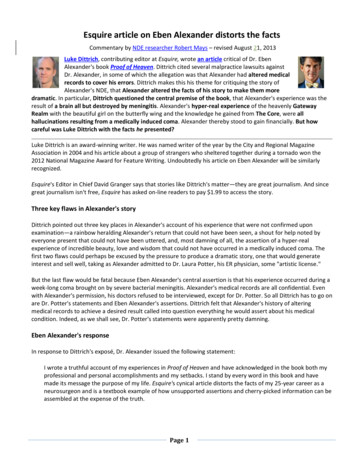
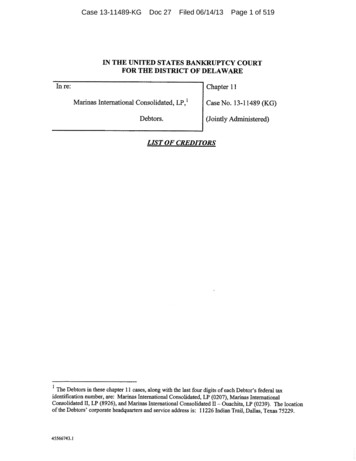

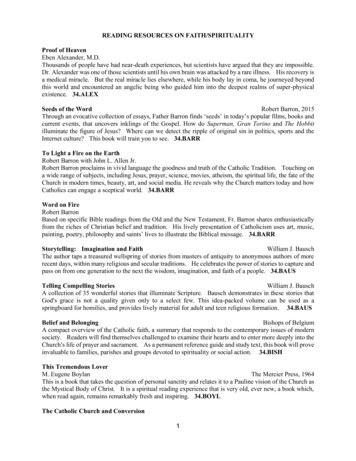
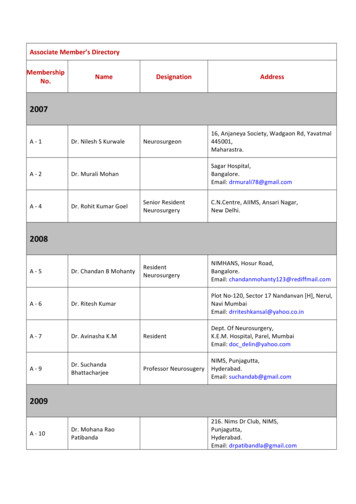
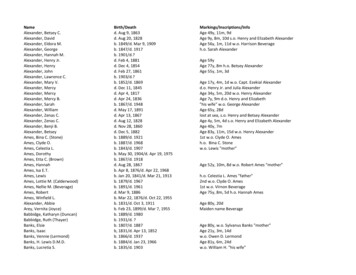


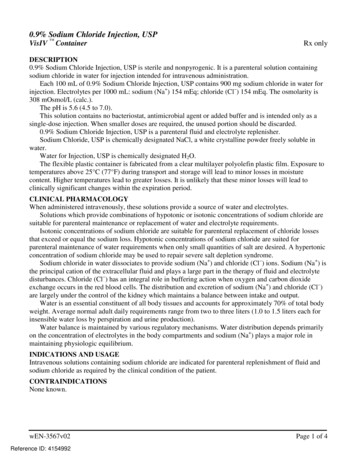
![Index [ firemarshal.dos.nh.gov]](/img/45/nh-fire-and-all-hazards-mobilization-plan.jpg)
